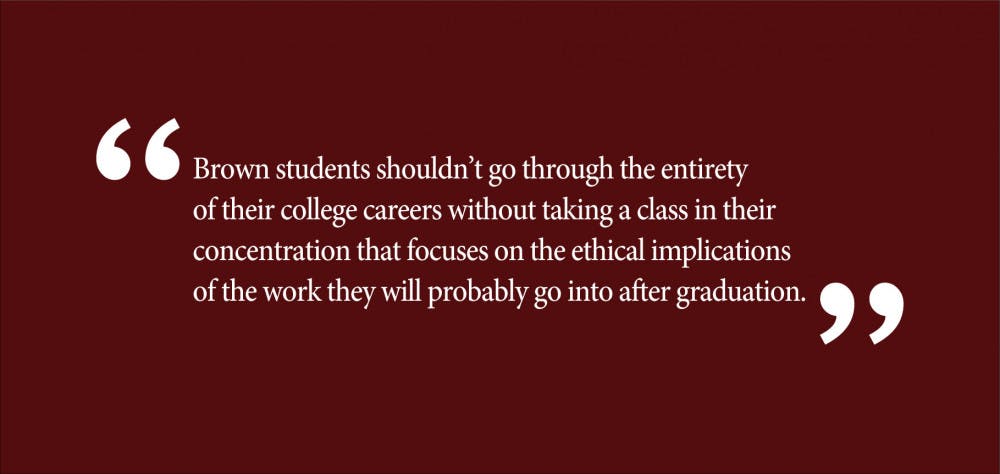Last year, I wrote a column in The Herald on why students who are concentrating in computer science and are planning to enter the tech industry should be cognizant of the harm that the industry is inflicting on cities such as San Francisco. As a native of San Francisco, I take this issue to heart. As I watch my peers at Brown secure amazing internships at high-impact companies like Uber and Twitter, I also see how, on a daily basis, these companies are gentrifying urban areas, killing local culture and making some neighborhoods too expensive for the average person to live in.
The CS department recently hired ethics teaching assistants in an effort to incorporate conversations about the social implications of the work they do in the department. The department has also offered some courses within the concentration that discuss ethical issues within computer science, like CSCI 1870: “Cybersecurity Ethics.” In this way, the CS department has made important strides in creating ethically-minded graduates.
But it’s not just CS concentrators who should be mindful of the profound effect their industry has on the world. Many other concentrations at Brown lead graduates to industries that have similarly consequential social impacts. Concentrations such as economics and biology ought to follow the example of the CS department by creating ethics-focused curricula. Brown students shouldn’t go through the entirety of their college careers without taking a class in their concentration that focuses on the ethical implications of the work they will probably go into after graduation. These courses can make Brown graduates more socially-minded when they enter the workforce.
Brown students may not prioritize the ethical and social consequences of the particular disciplines they are studying, because often they are the ones who will go on to benefit from current practices in the related industries. Some students may go through Brown without giving a second thought to the social ramifications of their post-graduate jobs. Some of the most popular concentrations at Brown are computer science, economics, biology and Business, Entrepreneurship and Organizations. A graduate who is considering entering any one of these fields must give greater priority to the field’s social impact than any of the concentrations currently require.
For example, graduates entering the business world and fields such as finance and consulting will be entering industries that can have immense impact on society without strict ethical rules. The decisions they make in these industries can affect the economy in important ways, and can have huge implications for the average citizen’s financial well-being. For example, hospital mergers, which are often facilitated by financiers and consultants, can have either positive or negative effects on patient outcomes depending on the structure of the merger. Since so many of Brown’s economics concentrators will eventually take powerful positions in these fields, their work will be more beneficial to society if they have a background in business ethics. Currently, economics does not require a single course that is focused only on ethics.
My concentration in biology could also stand to benefit from courses in bioethics. Whether students fall into the medical field or find themselves in research for industries like pharmaceuticals, they cannot dismiss the ethics of biomedicine. Big Pharma in the U.S. is known to be a corrupt industry, and lends itself to many ethical considerations, including the pricing of life-saving drugs and biotechnologies and the testing of human and animal subjects. For example, the opioid crisis was at least in part caused by over-prescription of opioid pain relievers because healthcare providers were reassured by pharmaceutical companies that the medications were not addictive. Other types of biological research require researchers to make ethical decisions, such as genetic engineering and stem-cell research. A bioethics course at Brown would serve biology concentrators well in whatever biology-related fields they decide to enter after Brown, but the biology concentration doesn’t require one.
Some students see concentration requirements as a to-do list, and therefore will not take a course in ethics if one is not required of them. But taking just one ethics class can make a difference in the way they carry themselves in the workplace. A 2011 study in Journal of the Scholarship of Teaching and Learning on how ethics classes can impact a student’s decision-making process showed that ethics classes can increase agreeableness, open-mindedness and, most importantly, the students’ ability to apply information to ethical dilemmas in the workplace. If just one intervention can change the way people interpret their impacts on the world around them, it would be in students’ best interests to consider ethics in their concentration.
We, as Brown students, have an immense amount of privilege, and a vast amount of knowledge at our fingertips. It’s best to use that knowledge for good and to think critically about the ethics of our postbaccalaureate work. The only way to guarantee that we do so is to ask concentrations like economics and biology to require ethics courses of their students.
Rachael Schmidt ’21 can be reached at rachael_schmidt@brown.edu. Please send responses to this opinion to letters@browndailyherald.com and op-eds to opinions@browndailyherald.com.



